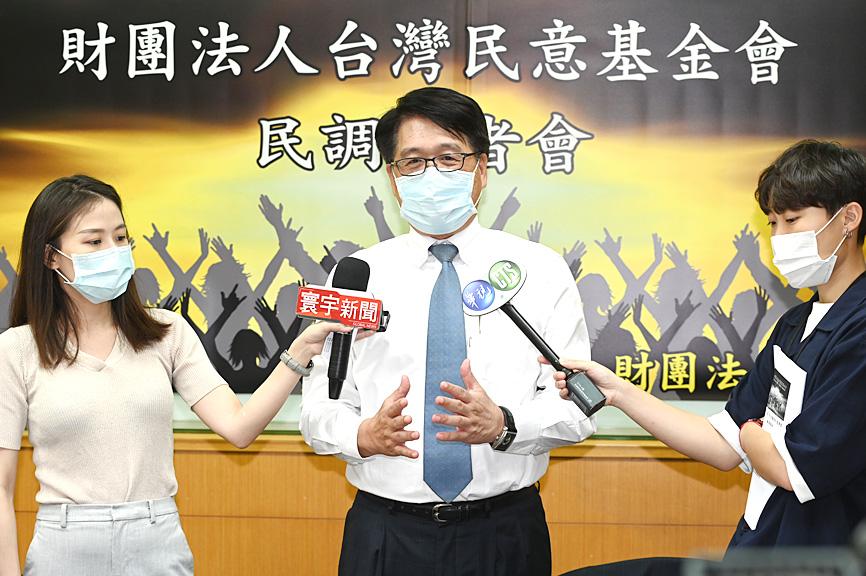Half of Taiwanese support independence, according to the results of a poll released yesterday by the Taiwanese Public Opinion Foundation, which also found that President Tsai Ing-wen’s (蔡英文) support rating fell by 7 percentage points.
Fifty percent of respondents supported independence, 25.7 percent supported maintaining the “status quo” and 11.8 percent supported unification, while 12.1 percent had no opinion, did not know or refused to answer, the foundation said.
Support for independence is the new mainstream opinion, regardless of which party is in power, foundation chairman Michael You (游盈隆) said.

Photo: Tien Su-hua, Taipei Times
Insinuations that Taiwan wants to maintain the “status quo” are a fabrication that could severely mislead the international community, he added.
Fifty-three percent of respondents welcomed US House of Representatives Speaker Nancy Pelosi’s visit to Taiwan, while 24 percent did not and 23 percent had no opinion.
The poll found that 55.2 percent think Chinese military exercises would decrease the willingness of Taiwanese to unify with China, 17.5 percent said they would reinforce such feelings and 8.1 percent said they would have no effect, while 12 percent had no opinion and 7.2 percent did not know.
Asked about the likelihood that China might attack Taiwan, about 36 percent said an invasion was highly improbable, 26.7 percent said there was some possibility, 16.7 percent said it was impossible, 12.3 percent said it was highly possible and 8.4 percent had no opinion.
Compared with last month, support for Tsai’s performance dropped by 7 percentage points to 45.7 percent. Meanwhile, dissatisfaction with her performance increased by 5.6 percentage points to 40.7 percent.
It is highly unusual for the support rating to drop so dramatically, especially given Pelosi’s visit and Chinese military drills, as presidents usually enjoy a boost in popular support when facing external pressures, You said.
The most probable explanation is internal politics, namely dissatisfaction with Tsai’s security leadership and a plagiarism scandal involving former Hsinchu mayor Lin Chih-chien (林智堅), he said.
Former Democratic Progressive Party legislator Lin Cho-shui (林濁水) said the Tsai administration’s response to China’s military exercises was weak and slow, as Taiwanese learned that Beijing had fired ballistic missiles over Taiwan from Japanese reports and not from the government.
The poll, conducted on Monday and Tuesday last week, polled people aged 20 or older by telephone. It collected 1,035 valid samples, with a confidence level of 95 percent and a margin of error of 3.05 percentage points.

Alain Robert, known as the "French Spider-Man," praised Alex Honnold as exceptionally well-prepared after the US climber completed a free solo ascent of Taipei 101 yesterday. Robert said Honnold's ascent of the 508m-tall skyscraper in just more than one-and-a-half hours without using safety ropes or equipment was a remarkable achievement. "This is my life," he said in an interview conducted in French, adding that he liked the feeling of being "on the edge of danger." The 63-year-old Frenchman climbed Taipei 101 using ropes in December 2004, taking about four hours to reach the top. On a one-to-10 scale of difficulty, Robert said Taipei 101

Nipah virus infection is to be officially listed as a category 5 notifiable infectious disease in Taiwan in March, while clinical treatment guidelines are being formulated, the Centers for Disease Control (CDC) said yesterday. With Nipah infections being reported in other countries and considering its relatively high fatality rate, the centers on Jan. 16 announced that it would be listed as a notifiable infectious disease to bolster the nation’s systematic early warning system and increase public awareness, the CDC said. Bangladesh reported four fatal cases last year in separate districts, with three linked to raw date palm sap consumption, CDC Epidemic Intelligence

Taiwanese and US defense groups are collaborating to introduce deployable, semi-autonomous manufacturing systems for drones and components in a boost to the nation’s supply chain resilience. Taiwan’s G-Tech Optroelectronics Corp subsidiary GTOC and the US’ Aerkomm Inc on Friday announced an agreement with fellow US-based Firestorm Lab to adopt the latter’s xCell, a technology featuring 3D printers fitted in 6.1m container units. The systems enable aerial platforms and parts to be produced in high volumes from dispersed nodes capable of rapid redeployment, to minimize the risk of enemy strikes and to meet field requirements, they said. Firestorm chief technology officer Ian Muceus said

MORE FALL: An investigation into one of Xi’s key cronies, part of a broader ‘anti-corruption’ drive, indicates that he might have a deep distrust in the military, an expert said China’s latest military purge underscores systemic risks in its shift from collective leadership to sole rule under Chinese President Xi Jinping (習近平), and could disrupt its chain of command and military capabilities, a national security official said yesterday. If decisionmaking within the Chinese Communist Party has become “irrational” under one-man rule, the Taiwan Strait and the regional situation must be approached with extreme caution, given unforeseen risks, they added. The anonymous official made the remarks as China’s Central Military Commission Vice Chairman Zhang Youxia (張又俠) and Joint Staff Department Chief of Staff Liu Zhenli (劉振立) were reportedly being investigated for suspected “serious